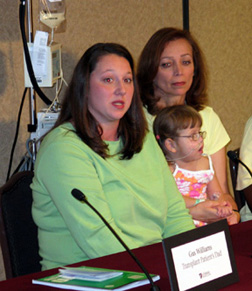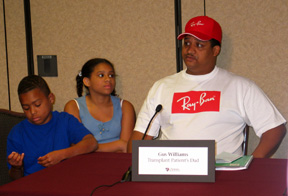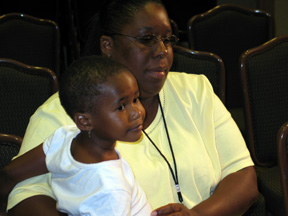 |
Denise Breaux, left, with her daughter, Bailey and her mother, Natalie. |
The young girl, who received a liver, small bowel and pancreas transplant from UNMC in 2002, had been admitted to the hospital just two days before the devastating storm for tests. Initially, the hospital had enough water and food, Breaux said, “then the levees broke and it became a panic.
“I knew if I could get to Omaha she would be OK,” Breaux said. “They’re like a second family up here.”
On Tuesday, Breaux and two other transplant families said thanks to the medical center family that has rescued them more than once. The transplant team hopes more of their former patients contact them soon to let them know they’re OK.
There are an estimated 40 to 50 former medical center patients in the affected area who have received liver, kidney, pancreas or small bowel transplants from the medical center, including 15 to 20 children, said Wendy Grant, M.D., a transplant surgeon and assistant professor of surgery at UNMC.
Once a transplant is complete, the hospital transplant team follows the patient for life, Dr. Grant said.
 |
Gus Williams, right, with his children, Gus Jr. and Jasmine. |
Now, Gus Williams and his children, who lived in Omaha nearly two years during the transplant process, plan to make Omaha their permanent home.
“It’s unbelievable,” the elder Williams said of the devastation in New Orleans. “It’s something probably none of us expected. We have to take it one day at a time.Everything I had is gone so I’m starting from scratch.”
Williams said he evacuated his son and daughter to Houston before Hurricane Katrina struck the Gulf Coast to keep his children out of harm’s way, particularly since his son is dependent on anti-rejection medicine that he takes twice a day.
Williams and his children are currently staying with a friend in Omaha.
 |
Tuesday Hill and her daughter, Jasmine |
She and her daughter, who received a liver transplant on May 16, 2003, arrived in Omaha Sunday night. “I knew once I got in touch with the hospital they would rescue us,” she said. “I’m considering relocating also.”
Fortunately, the Breaux family’s home in Raceland, La., about 45 miles southwest of New Orleans, escaped damage, Denise Breaux said. Her husband and Bailey’s twin brother are awaiting their return.
For a time, Denise Breaux was uncertain whether she’d get back to her family. After the storm, Bailey Breaux was airlifted to Texas Children’s Hospital without her mother, who gave up a seat on the helicopter to a mother whose child was in critical condition.
“It was very hard to give my kid to somebody else because no one else knows Bailey like I do,” Denise Breaux said. “I know all of her needs, all of her meds (medications) all of her cares. No body knows all of her needs like I do and I didn’t know if I was going to get back to her to get her everything she needed.”
Breaux and about 25 other pediatric parents at Tulane were evacuated by boat, taken to dry land and told a bus would pick them up. There was no bus, however, and the group found themselves wandering the streets. “It was horrible,” she said. “We were on the streets of New Orleans at 6 o’clock at night,” she said, fearful of looters and armed citizens.
With the help of a news reporter, the group made its way to a hotel where a bus picked them up and took them to Lafayette, La. From there, she got to Houston where she was reunited with her daughter. A medical flight transported them to Omaha.
Dr. Grant praised the parent’s quick actions saying: “These children are alive because their parents are so diligent. It’s a life threatening problem for our transplant patients to be without their medication, even for a day or two.”
The transplant team is expecting another transplant patient in the next day or two and is still waiting to hear from other transplant patients in the Gulf Coast area. “We hope they consider this their home way from home,” Dr. Grant said. “We can’t get them here fast enough.”